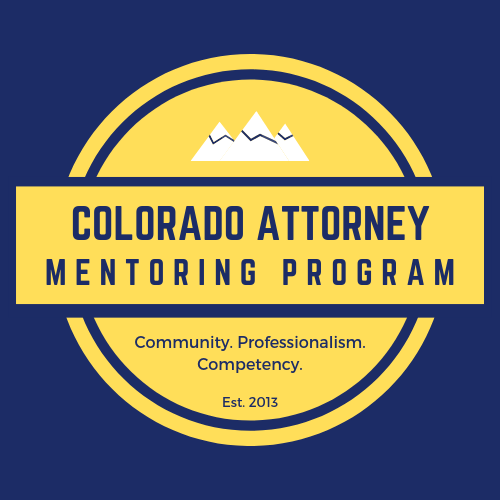A. Issues of Incivility in Legal Profession
The following are topics that the mentor and mentee might consider discussing regarding issues of incivility in the legal profession.
- What does “civility” mean in the context of the legal profession? How is it different from the dictionary definition of “politeness”? Read Professional Attitude from the ABA Journal and consider how Justice Kennedy defines “civility”: http://tinyurl.com/mx38nvb.
- What types of uncivil or unprofessional behavior do lawyers most frequently encounter? How serious is the problem and has it changed over time?
- How are lawyers dealing with unprofessional behavior when they encounter it? What did you learn in law school about dealing with unprofessional behavior?
- What are the causes of incivility? Discuss the driving factors behind incivility and how these may be encountered and neutralized in practice. Consider some of these examples:
- Client expectations based on how lawyers are portrayed in the media and entertainment,
- Increased competition among growing numbers of lawyers,
- Dissatisfaction of attorneys with their work or profession,
- A generally negative perception of lawyers by the public,
- Overburdened and overworked court systems,
- Abuse of the discovery process, and
- Belief that civil behavior may be perceived by an opposing party as weakness.
- Share with the new lawyer stories of attorneys who have ultimately harmed their client because of their incivility and lack of consideration in dealing with opposing counsel, the judge, or the jury.
Resources:
Richard L. Gabriel, Professionalism in Today’s Competitive Legal Market, 39 Colo. Law. 65 (June 2010).
Colorado Attorney Mentoring Program (CAMP) Mentoring Resource Center can be found on the CAMP website,https://coloradomentoring.org/mentoring-resources/mentoring-literature.
Colorado Bar Association Professionalism Coordinating Councils at the CBA Website,http://www.cobar.org/index.cfm/ID/20094/CCRL/Professionalism-Coordinating-Council/.
CLE Colorado, Inc. “Practicing with Professionalism”
B. Professional Conduct Duties of the Lawyer to the Client and to the Administration of Justice
The following are issues that the mentor and mentee might consider discussing regarding a lawyer’s duties to the client and to the administration of justice.
- What are the consequences when a lawyer is engaged in misconduct? What are examples of conduct that is prejudicial to the administration of justice? Might these examples also fall under the Rule 3.5(d) prohibition of conduct intended to disrupt a tribunal?
- How does “zealous” advocacy conform to duties of “civility”? When can zealous advocacy cross the line into incivility?
- Consider real-world examples of incivility and unprofessional behavior interfering with the administration of justice that may rise to the level of sanction or discipline:
- Respondent engaged in disparaging, humiliating and discriminatory e-mails against opposing counsel (Florida Bar v. Mitchell, SC10-637 (Fla. 2010));
- Respondent found guilty of unlawful misconduct while engaging in a series disparaging, humiliating, and discriminatory e-mails against opposing counsel (Florida Bar v. Mooney, SC10-640 (Fla. 2010));
- Posting information on website about confidential disciplinary investigation into alleged misconduct of rival law firm (In re Moran, 840 N.Y.S.2d 847 (N.Y. App. Div. 2007));
- Filing briefs making inflammatory personal attacks against opposing counsel (In re Abbott, 925 A.2d 482 (Del. 2007));
- Harassing and humiliating deponents and mischaracterizing deponents’ statements (In re Fletcher, 424 F.3d 783 (8th Cir. 2005));
- Making accusations of bias and racism in retaliation for an unfavorable ruling (In re Hayes, 777 N.Y.S.2d 120 (N.Y. App. Div. 2004));
- Filing petitions that demean the judiciary and the legal profession (In re McClellan, 754 N.E.2d 500 (Ind. 2001));
- Using profanities and physically attacking opposing counsel (In re Moore, 665 N.E.2d 40 (Ind. 1996); In re McClellan, 754 N.E.2d 500 (Ind. 2001)); and
- Failing to set forth a cogent legal argument in a brief, while accusing opposing counsel, using inflammatory language and caustic rhetoric of lying, acting illegally, violating the rules of professional conduct, defying court orders, and litigating the case for improper motives (Martin v. Essrig, 277 P.3d 857 (Colo. App. 2011)).
C. Strategies for Managing Incivility
The following are issues that the mentor and mentee might consider discussing regarding strategies to manage incivility.
- Share with the new lawyer an example of how you handled an uncivil lawyer and how the difficult relationship affected the representation.
- Identify characteristics of uncivil lawyers of which the new lawyer should be aware.
- Provide suggestions of the best and most professional ways to address areas where incivility commonly occurs: depositions, interrogatories and document requests, scheduling, continuances and extensions of time.
- Discuss how to handle disrespect, bad faith, accusations, name-calling, and claims that are baseless.
- Discuss the value of alternative dispute resolution processes. How might ADR processes reduce the likelihood of incivility? How might training in ADR methods help a lawyer better avoid incivility?
Resources:
Russell Carparelli, How to Manage Conflict and Increase Civility: The Skills Not Taught, 42 Colo. Law. 63 (Oct. 2013).
Colorado Attorney Mentoring Program (CAMP) Mentoring Resource Center, https://coloradomentoring.org/mentoring-resources/mentoring-literature.
Colorado Bar Association Professionalism Coordinating Councils at the CBA Website,http://www.cobar.org/index.cfm/ID/20094/CCRL/Professionalism-Coordinating-Council/.
D. Dealing with Difficult Clients
The following are issues that the mentor and mentee might consider discussing regarding how to deal with difficult clients.
- Discuss why lawyers should be concerned about difficult clients.
- Share with the new lawyer an example of a difficult client.
- Identify characteristics of difficult clients of which the new lawyer should be aware at the earliest contacts with the potential client, as well as how to factor that into accepting the potential representation.
- Identify client behaviors that occur during representation which indicate your client is angry or dissatisfied. Provide suggestions of the best and most professional ways to address the client and handle their anger.
- Discuss the importance of talking to a client as early as possible about realistic expectations of the representation, the scope of the representation, and the fee arrangement. Explain how discussing these (and other) issues can help to prevent misunderstandings and disagreement in your attorney-client relationship.
